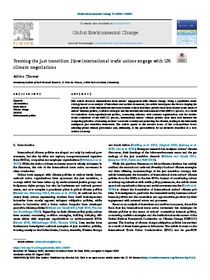Framing the just transition: how international trade unions engage with UN climate negotiations

2021
70
September
1-8
climate change ; trade union role ; environmental policy ; UN ; international cooperation
Trade unionism
https://doi.org/10.1016/j.gloenvcha.2021.102347
English
Bibliogr.
"This article discusses international trade unions' engagement with climate change. Using a qualitative methodology based on an analysis of interviews and archive documents, the article investigates the factors shaping the climate policies of the international union movement. It finds that these policies have been framed at the nexus of unions' internal politics, coalition strategies and the institutional environment of the UNFCCC process. As a result of contentious intra-organizational politics, contrasting alliances with external organizations and the institutional constraints of the UNFCCC process, international unions' climate policies have been torn between the competing priorities of ensuring workers' economic security and protecting the climate, leading to the inherently ambiguous just transition framework. The article speaks to the broader issues of the socio-political forces affecting global climate governance and, ultimately, to the preconditions for an inclusive transition to a low-carbon economy."
Digital
The ETUI is co-funded by the European Union. Views and opinions expressed are however those of the author(s) only and do not necessarily reflect those of the European Union or the ETUI.